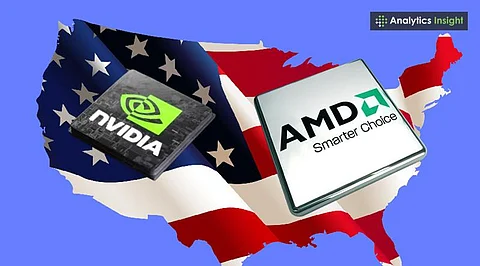

In an unusual and unprecedented move, NVIDIA (NVDA) and Advanced Micro Devices (AMD) have reached an agreement with the US government to hand over 15% of their revenue from certain chip sales to China in return for export licenses, according to a Financial Times report citing a US official.
NVIDIA China Sales have faced fluctuations due to shifting trade regulations. The AMD Export License could influence the company’s market access in key regions.
The deal applies specifically to NVIDIA’s H20 artificial intelligence chips and AMD’s MI308 processors, both designed for the Chinese market to comply with prior US export restrictions. Licenses allowing these sales were issued last week after months of trade tensions between Washington and Beijing.
This marks the first known case of US companies directly paying a portion of their earnings to the government in exchange for export approvals. Export control specialists told FT that they had never encountered such a precedent. The Trump administration has not yet disclosed how the collected funds will be used.
Earlier this year, both NVIDIA and AMD were prohibited from selling certain advanced AI chips to China, citing national security concerns. The restrictions were part of a larger Biden administration effort to restrict China's access to high-performance computing capabilities that could be used for military or surveillance purposes.
NVIDIA complied with the restrictions by developing the H20 chip just for the Chinese market. Sales were subsequently halted in April 2025 until recent negotiations produced a new revenue-sharing arrangement. Reports indicate that the agreement followed meetings between NVIDIA CEO Jensen Huang and President Trump.
Analysts say the deal underscores China’s importance to US chipmakers. Bernstein Research estimates NVIDIA could sell 1.5 million H20 chips in China by 2025, generating up to $23 billion in revenue.
Chinese tech giants such as Baidu, Alibaba, Tencent, and DeepSeek are among the major customers for these chips. However, the deal has generated controversy. Critics, including former US National Security Council adviser Lisa Tobin, have argued that monetizing export licenses would jeopardize the original security justification.
NVIDIA’s H20 Chip is designed to cater to high-performance AI computing needs. AMD’s MI308 Chip aims to compete directly in the growing AI and data center markets. Chinese commentators have accused Washington of using 'national security' as a pretext for economic leverage, likening the arrangement to a 'tollbooth' for US companies seeking access to the Chinese market.
While the licenses allow NVIDIA and AMD to re-enter a lucrative market segment, they still cannot sell their most advanced AI chips in China. How the revenue-sharing deal influences future US-China tech relations and whether it sets a precedent for other industries is unclear.
The US-China Tech Trade tensions continue to shape semiconductor industry strategies. For now, it indicates how to comply with export controls and safeguards while both maintaining a technological edge and identifying sizable business opportunities elsewhere.
